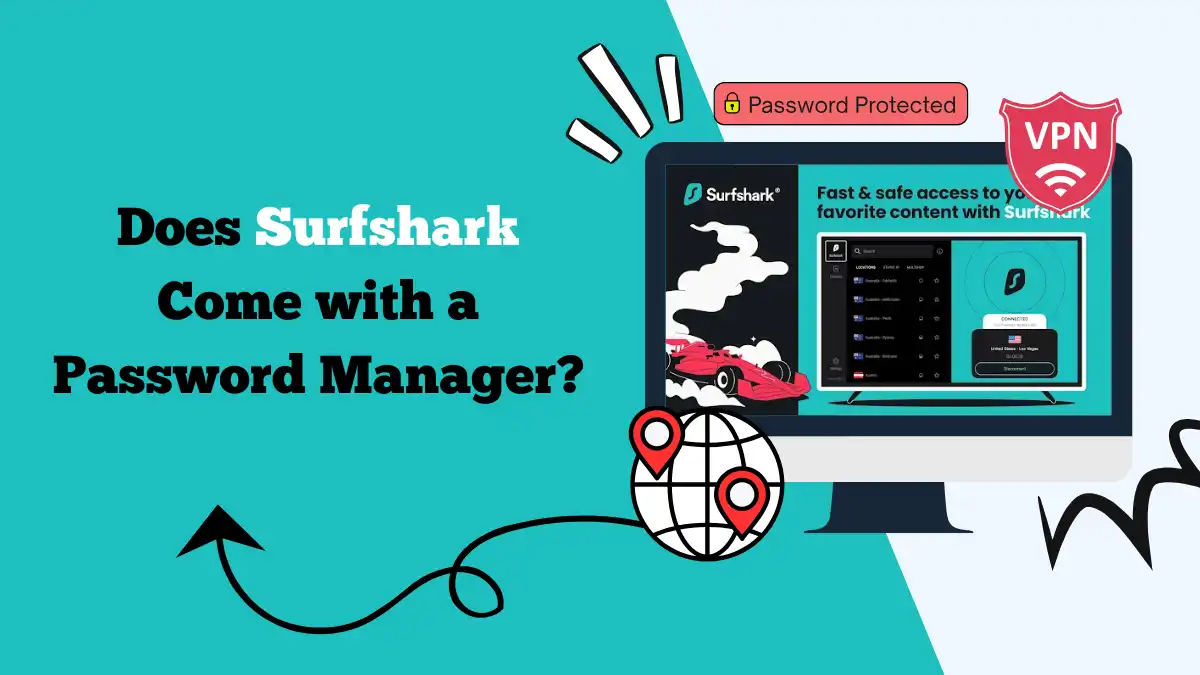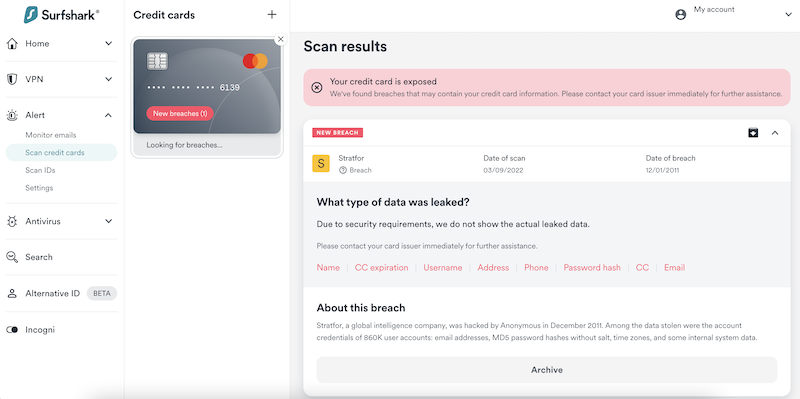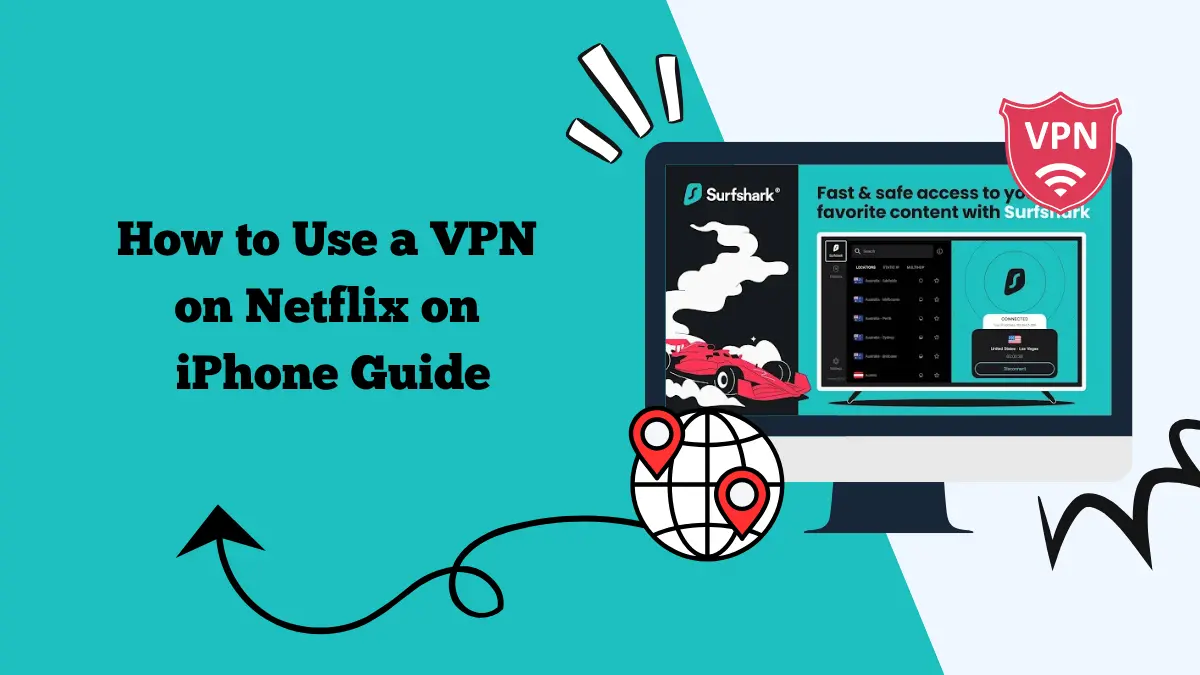Does Surfshark Come with a Password Manager?

If you are wondering about Surfshark password manager, unfortunately, there is none as the provider does not offer this feature yet.
Surfshark, a popular VPN provider, is widely known for its strong privacy features and security measures. However, it does not offer a built-in password manager. Many users might wonder if they can manage their passwords with Surfshark, given the importance of online security.
While Surfshark provides excellent tools for securing internet traffic and protecting user data, a password manager is not part of its package. To understand why this is important, let’s explore what password managers are, how they work, and why you might need one.
What is a Password Manager?
A password manager is a software tool that helps you store and manage your passwords in an encrypted vault. These tools are designed to help you avoid the hassle of remembering multiple complex passwords.
Instead of writing down your passwords or using the same one across multiple sites, a password manager securely stores them.
In addition to storing passwords, password managers often generate strong passwords for you, making it harder for hackers to guess or brute-force them. They may also autofill login details for websites and apps, saving you time and making the process more secure.
Learn more about Surfshark ad-blocker, Netflix with Surfshark, and Surfshark kill switch.
How Password Managers Work
A password manager works by storing your passwords in an encrypted database. When you create a new account on a website, the password manager will either suggest or generate a secure password for you. You can save this password in the manager, which will remember it for you.
When you want to log into a website, the password manager will automatically fill in the login details. All you need to remember is the master password, which unlocks the password vault. The vault is usually protected by encryption, meaning that even if someone gains access to the device, the passwords remain secure.
The security of a password manager relies on strong encryption. Some password managers also offer additional security layers, like two-factor authentication (2FA), which further protects your passwords.
Types of Password Managers (Local vs. Cloud)
There are two main types of password managers: local and cloud-based. Both have their pros and cons, but the choice largely depends on your security preferences.
Local Password Managers
Local password managers store your data on your own devices, such as your computer or phone. Your passwords are saved in a local database, which is usually encrypted.
This type of password manager does not require an internet connection to function, making it more secure in some ways. Because the data is not stored on a remote server, it’s less likely to be compromised in a mass data breach.
However, local password managers have limitations. If you lose or damage your device, you could lose access to your passwords. Also, managing passwords across multiple devices can be tricky since syncing data between devices requires manual intervention or a specialized service.
Cloud Password Managers
Cloud-based password managers store your passwords on secure servers, which allows you to access them from any device connected to the internet. This makes it easy to manage your passwords across multiple devices.
Most cloud password managers automatically sync your password vault, so you don’t need to worry about manually transferring your data.
While cloud-based managers are more convenient, they also come with additional risks. If the service provider is compromised, hackers could gain access to your passwords. However, many cloud-based password managers use end-to-end encryption, meaning that even the service provider cannot access your data.
Risks of Using a Password Manager
While password managers offer a lot of benefits, there are some risks involved. Understanding these risks can help you make an informed decision about which type of password manager is right for you.
1. Single Point of Failure
Password managers store all your sensitive login details in one place. If someone gains access to your password manager, they could potentially unlock all of your accounts. This is why using a strong master password is critical.
Some password managers also allow two-factor authentication, which adds an extra layer of security.
2. Data Breaches
Although password managers employ strong encryption, they remain vulnerable to data breaches. If a password manager provider’s servers are compromised, hackers could gain access to stored passwords.
3. Loss of Master Password
If you forget your master password, you could lose access to your password vault. Most password managers offer recovery options, but if you don’t set them up, regaining access can be difficult or impossible. It’s important to choose a password manager that offers a reliable recovery process.
4. Phishing Attacks
Some password managers are targeted by phishing attacks. Hackers may try to trick you into revealing your master password or other sensitive information. Being cautious about phishing emails and websites is crucial when using any online service, including password managers.
Despite these risks, using a password manager is generally safer than trying to manage passwords manually or using weak passwords across multiple accounts. The risks can be minimized by using a strong master password, enabling two-factor authentication, and choosing a reputable provider.
What is Surfshark Alert and Its Uses?
While there is no Surfshark password manager, the provider does offer a feature called Surfshark Alert. Surfshark Alert is designed to monitor your email addresses and notify you if they appear in any known data breaches.
When you use online services, there’s always a risk that your data could be exposed in a breach. Hackers frequently target companies and websites to steal personal information, including login credentials.

Once your information is compromised, it can be used for malicious activities like identity theft or unauthorized access to your accounts.
Surfshark Alert helps mitigate this risk by continuously scanning for your personal information in databases of known breaches. If your email or other personal details are found, Surfshark will alert you so that you can take action, such as changing your password or monitoring your accounts for suspicious activity.
Surfshark Alert is especially useful for people who use the same email across multiple services, as it can help identify breaches early and prevent further damage. While it doesn’t manage or store your passwords, it adds another layer of security by alerting you to potential risks before they become a problem.
Conclusion
Although Surfshark does not provide a built-in password manager, it does offer other privacy and security tools, such as Surfshark Alert, to help protect your data. A password manager remains an essential tool for anyone looking to improve their online security.
By using a password manager, you can store, generate, and auto-fill strong passwords without the need to remember each one. With features like end-to-end encryption and two-factor authentication, password managers make managing your online credentials both easy and secure.
If you are looking for a comprehensive security solution, you may need to combine Surfshark with a reliable third-party password manager.
While Surfshark excels at protecting your internet connection and privacy, a password manager will help you keep your online accounts secure by storing and managing your passwords safely.





